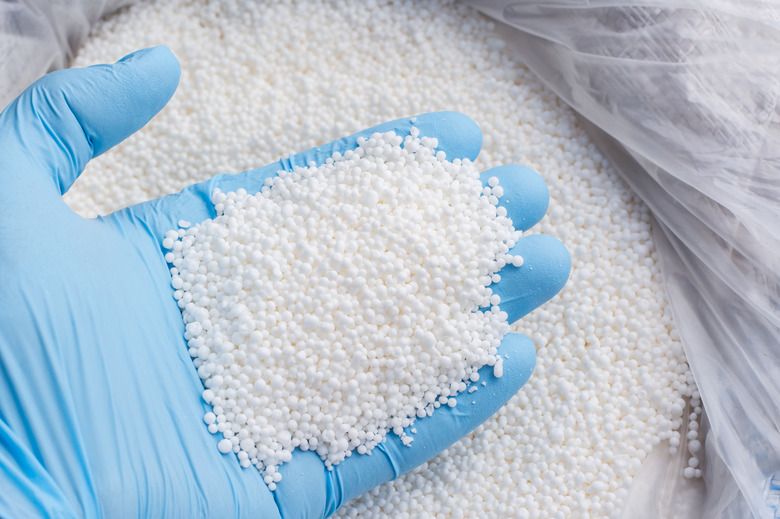What Is Sulfate?
Sulfate is a naturally occurring polyatomic ion consisting of a central sulfur atom surrounded by four oxygen atoms, Its chemical formula is SO42-. The oxygen atoms are arranged in a tetrahedral structure, and within the structure, the sulfur atom is in the +6 oxidation state while each of the oxygen atoms is in the -2 oxidation state. Hence the overall -2 charge of the ion. Sulfates are salts produced by combining sulfuric acid with other substances.
Sulfates are common in Earth's geophysical structure and form compounds with a large number of metals. Some of the most common cation-anion combinations are hydrated calcium sulfate, which is the gypsum found in drywall; magnesium sulfate, or Epsom salts; and copper sulfate, which is an algicide. In fact, there are hundreds of minerals in the Earth's crust that contain sulfate as one of their components.
Sulfate in Shampoos and Detergents
Sulfate in Shampoos and Detergents
Sulfate is a surfactant, which means it attracts both oil and water, and it is largely responsible for the foaming action of soaps, shampoos and detergents. The most common sulfate found in cleaning products is sodium laureth sulfate, or SLES. It is derived from petrolatum. That's another name for petroleum jelly, which itself is derived from petroleum.
Sulfate can irritate the skin and eyes, as anyone who has ever gotten soap in their eyes can attest. It also strips your hair of natural oils because it works so aggressively. However, authorities such as the Canadian Cosmetic, Toiletry and Fragrance Association agree that it are generally safe. Sulfate can dull your hair, though, by leaving an anionic (negative) charge when you rinse. The reason you need conditioner is to neutralize this charge. Also, your hair may take longer to dry after you wash with a sulfate product.
Because it is derived from petroleum, SLES can contain trace amounts of cancer-causing chemicals, such as ethylene oxide and 1,4-dioxane. The concentrations of these chemicals are rarely high enough for concern, although authorities are reviewing them.
The Difference Between Sulfate and Sulfite
The Difference Between Sulfate and Sulfite
The sulfite ion has one less oxygen atom than the sulfate ion, making its chemical formula SO32-. If you read labels, you'll often find sulfites in food products because it's added as a preservative. You'll also find sulfites in wine. The fermentation of yeast produces a certain amount of sulfites naturally, but vintners usually add more to lengthen the shelf life of the product.
When ingested, sulfites are processed by the liver and turned into sulfates. About 1 in 100 people have allergic reactions to sulfites and should avoid them. Besides wine and beer, that means avoiding many processed foods, including jams, potato chips, dried fruit and vegetable juices.
Sulfas – a Third Class of Sulfur Compounds
Sulfas – a Third Class of Sulfur Compounds
Sulfa drugs are organic compounds called sulfonamides. Sulfathiazole (called sulfatiazol in some countries) is one of the best known of these. A topical and oral antimicrobial compound, it was widely used until less toxic alternatives were developed. There are thousands of drugs of this type, and they work by inhibiting the growth of bacteria, although they don't actually kill them.
Just as people can have allergic reactions to sulfites, they can also be allergic to sulfa drugs, which are often used as antibiotics. However, the allergies are different, so if you're not sensitive to sulfites, you can still have a reaction to sulfonamides and vice versa.
References
- The David Suzuki Foundation: The Dirty Dozen: Sodium Laureth Sulfate
- Healthline: Should You Be Going Sulfate-Free?
- Web MD: What Is Sulfite Sensitivity?
- Illiumai: What Are Sulfates? And Why Should You Care if a Shampoo Is Sulfate-Free?
- Purdue: Oxidation Numbers
- Best Health Magazine: The Truth About Sulfates
Cite This Article
MLA
Deziel, Chris. "What Is Sulfate?" sciencing.com, https://www.sciencing.com/sulfate-5457669/. 24 October 2018.
APA
Deziel, Chris. (2018, October 24). What Is Sulfate?. sciencing.com. Retrieved from https://www.sciencing.com/sulfate-5457669/
Chicago
Deziel, Chris. What Is Sulfate? last modified March 24, 2022. https://www.sciencing.com/sulfate-5457669/
